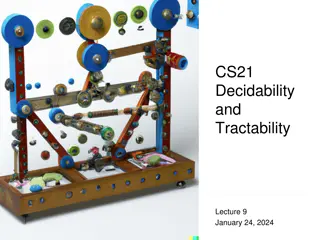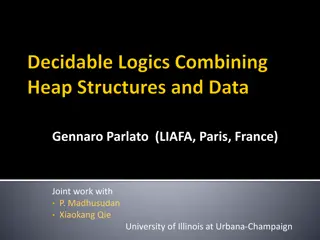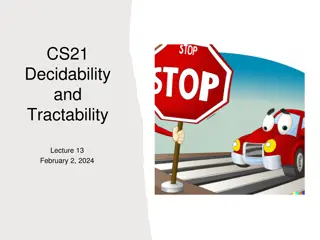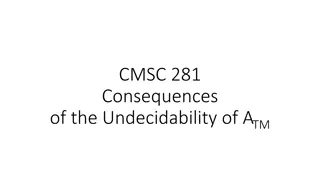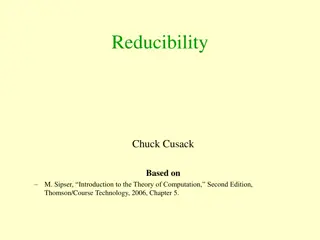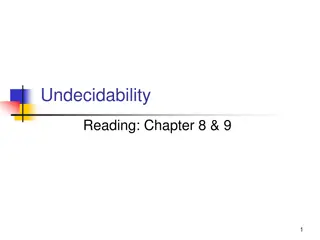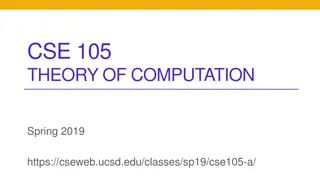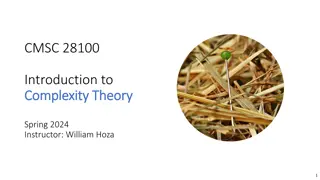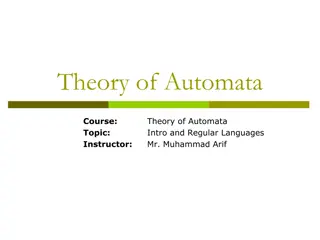Understanding Decidability and Tractability in CS21 Lecture
Explore the concepts of decidability and tractability in the CS21 lecture on January 24, 2024. The lecture covers topics such as converting context-free grammars into Chomsky Normal Form, algorithms for determining language generation, worst-case running times, dynamic programming strategies, and de
3 views • 31 slides
Next-Generation Logic for Program Verification Challenges
Explore the innovative work by Gennaro Parlato and collaborators on a new logic for reasoning with programs that manipulate heap and data using deductive verification and SMT solvers. This research delves into the complexities of unbounded structures and data, addressing challenges in classical theo
0 views • 31 slides
Understanding Reductions in Decidability and Tractability
Exploring the concepts of reductions, particularly many-one reductions, in the context of decidability and tractability. The lecture delves into the relationship between decidable and undecidable problems, highlighting examples like Rice's Theorem. It explains the definitions and implications of red
0 views • 20 slides
Undecidability Consequences and Other Problems in Computer Science
Explore the undecidability of the Acceptance Turing Machine (ATM) and its implications in recognizing languages, including the relationship between decidability and recognizability. Discover the undecidability of the Halting Problem and its significance in computational theory.
0 views • 10 slides
Undecidability and Reductions in Theory of Computation
Explore the undecidability of the halting problem and ATM, using reductions to show their non-decidability. Discover how problems are reduced from A to B in computation theory, enabling the solution of one problem by solving another.
0 views • 30 slides
Understanding Recursive and Recursively Enumerable Languages
Exploring the concepts of decidability and undecidability in computer science, specifically focusing on Recursive and Recursively Enumerable (RE) languages. Recursive languages always halt, while RE languages may or may not halt, showcasing the differences between decidable and undecidable problems.
0 views • 35 slides
Automata Theory and Theory of Computation Overview
This course overview covers concepts in automata theory and theory of computation, including formal language classes, grammars, recognizers, theorems in automata theory, decidability, and intractability of computational problems. The Chomsky hierarchy, interplay between computing components, modern-
0 views • 42 slides
Theory of Computation: Decidability and Encoding in CSE 105 Class
Explore the concepts of decidability, encoding, and computational problems in CSE 105 Theory of Computation class. Learn about decision problems, encodings for Turing Machines, framing problems as languages of strings, and examples of computational problems and their encodings. Gain insights into th
0 views • 26 slides
Understanding Complexity Theory: Decidability, Undecidability, and Reductions
Explore the concepts of decidability and undecidability in complexity theory, discussing the proof of undecidability for various languages. Learn about the acceptance problem and reductions, including mapping reductions, to relate and solve different computational problems effectively.
0 views • 14 slides
Theory of Automata: Introduction and Regular Languages Overview
This course delves into the fundamentals of Theory of Automata, exploring topics such as regular languages, finite state models, grammars, Turing machines, and more. Instructor Mr. Muhammad Arif guides students through essential concepts like finite automata, pumping lemma, decidability, and Chomsky
0 views • 95 slides
